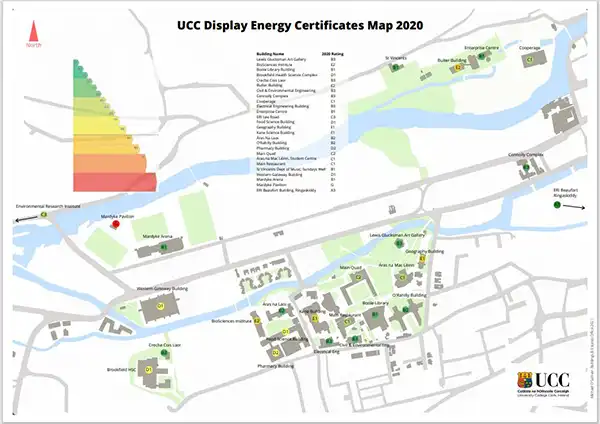In This Section
- Home
- About
- Student Led
- Research Informed
- Practice Focused
- Resources
- Case Studies
- Green Labs Community
- News
- Office of Sustainability and Climate Action
Display Energy Certificate (DEC)

Every year UCC, like other public bodies, are required to undertake an exercise to calculate the energy performance of our buildings and display that performance through a Display Energy Certificate (DEC). The original intent of the DEC process was to give building owners an idea of how their buildings are performing in comparison to othe
Every year UCC, like other public bodies, are required to undertake an exercise to calculate the energy performance of our buildings and display that performance through a Display Energy Certificate (DEC).

The original intent of the DEC process was to give building owners an idea of how their buildings are performing in comparison to other similar buildings and depending on the rating achieved, nudge those owners to make energy efficiency improvements.
More recently the topic of DEC’s has made its way into Irelands Climate Action Plan, with the goal of increasing the number of DEC’s generated in Ireland.
Our most recent DEC process was completed in November 2020 and the results are tabled below and raise a number of interesting observations, most notably;
The Beaufort building, opened in 2015, holds UCC’s only A rated certificate.
40% of the buildings covered achieved a B rating, including the Mardyke Arena, Glucksman Gallery and the Connolly complex.
Our historic Quad building came in with a C2 rating.
Our most energy efficient building, the Western Gateway, registered a D rating due to the energy intensive nature of the research activities that take place within the building.
The Mardyke Pavilion achieved our lowest rating of G, driven largely by the energy consumed in the flood lighting systems installed in the track and pitches.
| Building Name | 2020 Rating |
|---|---|
| Lewis Glucksman Art Gallery |
B3 |
| BioSciences Institute |
E2 |
| Boole Library Building |
B1 |
| Brookfield Health Science Complex |
D1 |
| Creche Cois Laoi, BHSC, College Road |
B3 |
| Butler Building (Plant Science) North Mall Campus |
E2 |
| Civil & Environmental Engineering Building |
B3 |
| Connolly Complex, Western Road |
B3 |
| Cooperage Building, North Mall |
C1 |
| Electrical Engineering Building |
B3 |
| Enterprise Centre, North Mall Cork |
B1 |
| Environmental Research Institute |
C3 |
| Food Science Building |
D1 |
| Geography Building |
E1 |
| Kane Science Building |
E1 |
| Áras Na Laoi |
B2 |
| O’Rahilly Building |
B2 |
| Cavanagh Pharmacy Building |
D2 |
| Main Quad |
C2 |
| Áras na Mac Léinn, Student Centre |
C1 |
| Main Restaurant |
C1 |
| St Vincents Dept of Music, Sundays Well |
B1 |
| Western Gateway Building |
D1 |
| Mardyke Arena Health & Leisure Centre |
B1 |
| Mardyke Pavilion |
G |
| UCC Beaufort Building, Ringaskiddy |
A3 |
In the coming weeks we will posting our DEC certs in the buildings as well as making them available online for you to review.
Some further information on the DEC process is listed below but in the meantime feel free to contact Pat Mehigan with any queries or comments you may have.
Thank you.
What is a Display Energy Certificate (DEC)?
A Display Energy Certificate (DEC) shows the grade awarded, energy and CO2 performance indicators, and the buildings energy trends. A DEC provides a building energy rating from A to G, where A is very efficient and G is the least efficient and are based on the actual amount of metered energy used in the building over a period of 12 months.
What is the policy behind the requirement to display a DEC?
The introduction of DECs came about to raise public awareness of energy efficiency in publicly accessed buildings and to encourage building owners to adopt energy efficiency measures by displaying their energy performance.
Buildings that require a DEC
- A building other than a dwelling, which is occupied by a public body, and has a total useful floor area greater than 250m2, and is frequently visited by the public.
- A building other than a dwelling, which has a total useful floor area greater than 500m2, and is frequently visited by the public.
How a DEC is calculated?
Benchmarks are used to take local factors into consideration when calculating the DEC. Benchmarks include specific building use categories with standard use patterns, certain locations, and climate.
Sources:https://www.seai.ie/business-and-public-sector/display-energy-certificate/
Green Campus
Contact us
University College Cork, College Road, Cork T12 YN60,
- greencampus@ucc.ie
- Dr Maria Kirrane, Sustainability Officer - m.kirrane@ucc.ie
